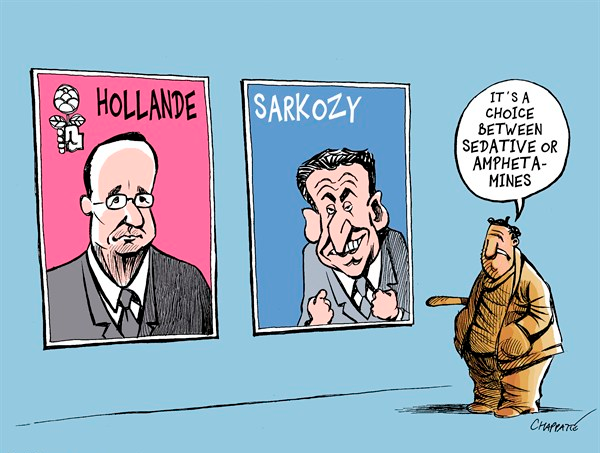It will be a Democratic Congress and President that will destroy the social safety. Ryan Grimm at Huffington Post reports that House Minority Leader Nancy Pelosi supports the Simpson-Bowles plan:
During a recent press conference, and again during an interview with Charlie Rose, the California Congresswoman said that she would support what’s known as the Simpson-Bowles plan, a budget proposal that was created by the co-chairs of a fiscal commission set up by President Obama (dubbed the “Catfood Commission” by progressives). The plan was rejected by members of the commission, failing to win the necessary votes to move to a vote in Congress. Yet the co-chairs — former Republican Sen. Alan Simpson of Wyoming and Morgan Stanley director Erskin Bowles, a Democrat — have worked recently to revive it, and the political class speaks of it as if it passed and is an official recommendation of the commission.
At the end of March, a version of the Simpson-Bowles plan was given a vote on the House floor. It was annihilated, 382-38, with Pelosi and most Democrats voting against it.
But Pelosi, the day after the vote, said that she could still support the plan if it stuck more closely to the original version put out by Simpson and Bowles. “I felt fully ready to vote for that myself, thought it was not even a controversial thing … When we had our briefing with our caucus members, people felt pretty ready to vote for it. Until we saw it in print,” she said. “It was more a caricature of Simpson Bowles, and that’s why it didn’t pass. If it were actually Simpson-Bowles, I would have voted for it.”
Yet when the Simpson-Bowles plan had been originally unveiled, Pelosi called it “simply unacceptable.”
In early April, Pelosi was asked about her initial opposition. “My problem with it was what it did as far as Social Security is concerned. Apart from that we said, there’s a lot to work with,” she told Charlie Rose. “It was a good framework in terms of revenue and in terms of cuts, in terms of defense spending and the rest. It was very bold.”
The Simpson-Bowles plan is a mix of tax increases and spending cuts that trims four trillion dollars off the deficit in ten years. Its cuts to social spending and entitlement programs made it “simply unacceptable” to the Democrats’ liberal base almost as soon as it was announced. Pelosi’s rhetorical retreat from that hard-line position has progressives worried they’ll have nobody left to defend the social safety net, even Medicare and Social Security.
Progressives need to be really worried, as Gaius Publius at AMERICAblog tells us the “push is on” to “compromise” on Social Security:
All you need to know? Pete Peterson lives for one reason only – to kill off Social Security. Every crazed billionaire has a project. This is his. (No exaggeration; check the link. It’s an excellent William Greider piece.)
From the “Summit” invite (but click fast; pages that name these names disappear fast at the “Summit” website). The underscoring below is mine:
Media Advisory PETERSON FOUNDATION TO CONVENE 3RD ANNUAL FISCAL SUMMIT IN WASHINGTON ON MAY 15
Participants to include President Bill Clinton, Speaker of the House John Boehner, Secretary of the Treasury Timothy Geithner, Senator Rob Portman, Congressman Paul Ryan, Congressman Chris Van Hollen, and National Commission on Fiscal Responsibility and Reform Co-Chair Alan Simpson
NEW YORK (May 08, 2012) – Against the backdrop of the upcoming elections, and with a series of key fiscal deadlines approaching at the end of the year, the Peter G. Peterson Foundation’s 2012 Fiscal Summit: America’s Case for Action will feature the nation’s leading experts and elected officials in discussions about the fiscal, economic, and political crossroads facing the country. …
This year’s summit will explore opportunities for compromise and establish the urgent need for action on these challenges, as well as highlight the voices of engaged citizens from across the country. The 2012 Fiscal Summit will work to generate the momentum necessary to motivate lawmakers to take action essential to preserving the American Dream.
Two videos that Gaius featured are significant because as he points out President Barack Obama is on the same page Bill Clinton, Paul Ryan and Pete Peterson.
5-25-2011 Leaked cell phone footage of Bill Clinton cozying up to Paul Ryan. The day after the stunning upset in the special congressional election in upstate New York, Rep. Paul Ryan is a man under fire.
Barack Obama’s speech on April 5, 2006 at the launch of The Brookings Institute’s Hamilton Project where Obama says that “most of us are strong free traders” and praises the goals of the Hamilton Project.
This is the “real grand bargain”
The real Grand Bargain isn’t between the Dems and Republicans. It’s between both of them and
you. They’re offering to sell out your children’s Social Security, in exchange for letting you keep your own.
Send Nancy a message. Sign the petition and tell her: Draw a line in the sand on cuts to Social Security, Medicare and Medicaid benefits


 While all eyes were on France, the ouster of Nicholas Sarkozy and a rejection of austerity, Iran has been conducting its first elections since the 2009 elections that reinstalled Mahmoud Ahmadinejad as president. This was the second round of voting for seats in the Parliament elections that were held in March. It has dealt a blow to Ahmadinejad and his supporters with a shift to more conservative backers of Ayatollah Ali Khamenei. The rift between Ahmadinejad and the Ayatollah began with dispute over the choice of the national security chief. The
While all eyes were on France, the ouster of Nicholas Sarkozy and a rejection of austerity, Iran has been conducting its first elections since the 2009 elections that reinstalled Mahmoud Ahmadinejad as president. This was the second round of voting for seats in the Parliament elections that were held in March. It has dealt a blow to Ahmadinejad and his supporters with a shift to more conservative backers of Ayatollah Ali Khamenei. The rift between Ahmadinejad and the Ayatollah began with dispute over the choice of the national security chief. The  The French Presidential election will take place this Sunday, May 6. Meanwhile, the campaigning has ended Friday evening with the Socialist challenger,
The French Presidential election will take place this Sunday, May 6. Meanwhile, the campaigning has ended Friday evening with the Socialist challenger,
Recent Comments